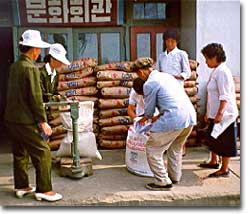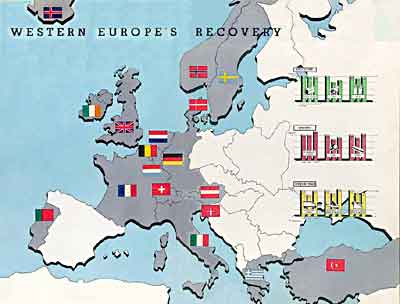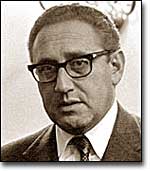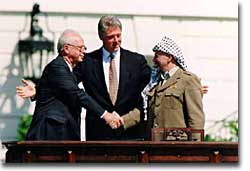Starting in the Later 1800's, the Foreign Policy of the United States Can Best Be Described as

11a. Foreign Policy: What Now?

The United States exercises its foreign policy through economic help. For example, famine relief in Northward Korea provides not but humanitarian assistance but too a foothold for the development of democratic ideals and institutions.
George Washington's Adieu Address in 1789 contained one major piece of advice to the country regarding relations with other nations: "avoid entangling alliances." Those words shaped United States foreign policy for more than a century.
Today some Americans recollect that Washington'southward words are withal wise ones, and that the United States should withdraw from world affairs whenever possible. In truth, withal, the U.s. has been embroiled in earth politics throughout the 20th century, and equally a effect, foreign policy takes up a great deal of regime's time, energy, and money.
If isolationism has become outdated, what kind of foreign policy does the United States follow? In the years after World State of war II, the The states was guided mostly past containment — the policy of keeping communism from spreading beyond the countries already nether its influence. The policy applied to a world divided by the Cold War, a struggle between the Us and the Soviet Wedlock.
With the plummet of the Soviet Marriage in 1991, containment no longer made sense, and so in the past ten years, the United States has been redefining its foreign policy. What are its responsibilities, if any, to the residuum of the world, now that it has no incentive of luring them to the American "side" in the Cold War? Practice the United states of america still need allies? What activeness should be taken, if whatsoever, when a "hot spot" erupts, causing misery to the people who alive in the nations involved? The answers are not like shooting fish in a barrel.

The economical side of containment: the Marshall Plan was devised to prevent communist takeover of European nations by pumping American aid into the ailing economies and infrastructures of Western Europe.
Foreign Policy Goals
To investigate the nature of current The states foreign policy, the logical source is the State Department, whose job it is to define and direct information technology. Foreign policy goals include the following:
- Preserving the national security of the United states
- Promoting globe peace and a secure global environs
- Maintaining a balance of ability among nations
- Working with allies to solve international problems
- Promoting democratic values and human rights
- Furthering cooperative foreign trade and global involvement in international trade organizations
Examining these goals closely reveals that they are based on cooperation with other nations, although "preserving the national security of the U.s.a." implies possible competition and conflict.

Who Makes Foreign Policy?

Henry Kissinger served as National Security Adviser and Secretary of State nether Presidents Nixon and Ford. He was a key figure in articulating U.South. strange policy during the Cold War.
As with all policy making, many people and organizations take a paw in setting The states strange policy. The master objective of foreign policy is to utilise affairs — or talking, meeting, and making agreements — to solve international bug. They endeavor to go along problems from developing into conflicts that require war machine settlements.
The President almost ever has the main responsibility for shaping foreign policy. Presidents, or their representatives, meet with leaders of other nations to try to resolve international problems peacefully. According to the Constitution, Presidents sign treaties with other nations with the "advice and consent" of the Senate. And then the Senate, and to a lesser extent, the Business firm of Representatives, besides participate in shaping foreign policy.
The Secretary of Country and many other officials of the State Department play major roles in setting foreign policy. The Secretary of State is usually the President's primary strange policy adviser, and he or she is the chief coordinator of all governmental actions that affect relations with other countries.
The Strange Service consists of ambassadors and other official representatives to more than 160 countries. Ambassadors and their staffs set embassies in the countries recognized by the United States and serve as an American presence abroad. The embassies are role of the State Department, and they protect Americans overseas and are responsible for harmonious relationships with other countries.

Presidents can play a prominent role in the germination of foreign policy by brokering negotiations between disputing parties. Here, President Clinton meets with Palestinian President Yasser Arafat and Israeli Prime Minister Yitzhak Rabin.
The National Security Council, as part of the Executive Office of the President, helps the President bargain with strange, military, and economical policies that touch on national security. It consists of the President, the Vice President, the Secretary of Land, the Secretary of Defense, and others that the President designates. The National Security Adviser — who coordinates the Quango — sometimes has as much influence as the Secretary of State, depending on his or her relationship with the President.
The Fundamental Intelligence Agency (CIA), one of the best-known agencies that sets strange policy, gathers, analyzes, and transmits data from other countries that might be of import to the security of the nation. Although the CIA is notorious for its participation in "spy" piece of work and "height secret" investigations, much of its work is public and routine. The CIA Director is appointed by the President and confirmed by the Senate.
U.s.a. foreign policy has changed dramatically from George Washington's 24-hour interval. Although Americans always pay attending to the advice of their revered founder, the earth is of form not the aforementioned. The many people that shape American foreign policy today accept the fact that the Us is a member of a world community that cannot afford to ignore the importance of getting along.
solorzanojoyinewerhat.blogspot.com
Source: https://www.ushistory.org/gov/11a.asp
Postar um comentário for "Starting in the Later 1800's, the Foreign Policy of the United States Can Best Be Described as"